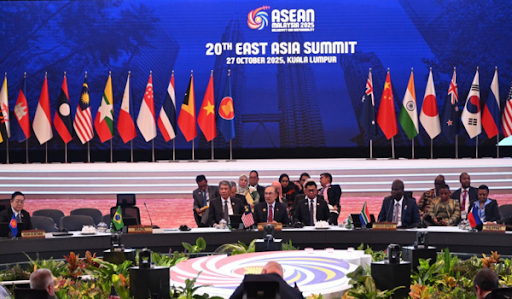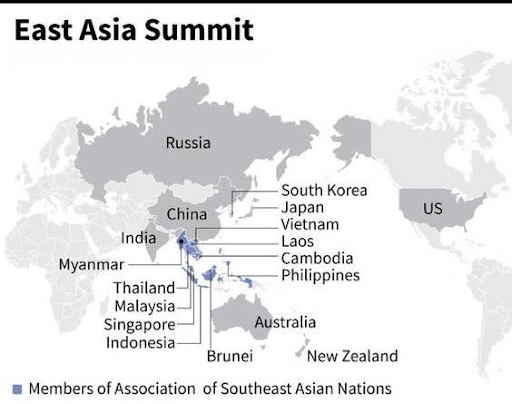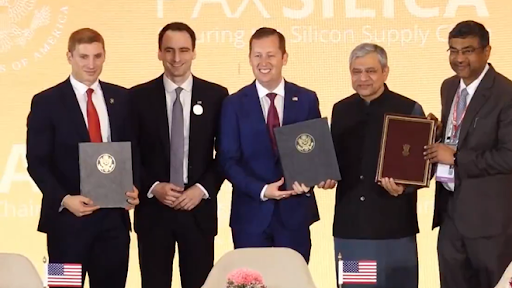



The Kuala Lumpur Declaration (2025), adopted at the 20th East Asia Summit by 18 nations, reaffirms commitment to regional peace, stability, ASEAN Centrality, a rules-based order, and multilateralism, aligning with India's Act East policy for a secure Indo-Pacific.

Copyright infringement not intended
Picture Courtesy: NEWSONAIR
The 20th East Asia Summit (EAS), held in Kuala Lumpur, Malaysia, on October 27-28, 2025, adopted the Kuala Lumpur Declaration on Peace and Stability.
It serves as a forum where major powers and ASEAN nations discuss cooperation and manage regional challenges.
Origin and Evolution
Membership

Objectives
Key Areas of Cooperation (16 Sectors)
Peace and security, sustainable development, climate and energy, education, finance, health, natural disaster management, connectivity, trade, food security, maritime cooperation, and poverty alleviation.
Reaffirmation of Core Commitments
Addressing Geopolitical Tensions
South China Sea Disputes
Economic and Development Cooperation
Regional Peace Accord
India sees the EAS as central to its Act East Policy and Indo-Pacific Oceans Initiative (IPOI).
Strategic Engagement
India uses the EAS to interact with major global powers like the US, China, Japan, and Russia, strengthening its regional influence.
Indo-Pacific Vision
Economic and Connectivity Initiatives
Security and Maritime Cooperation
Cultural and Educational Diplomacy
Source: NEWSONAIR
|
PRACTICE QUESTION Q. Which Southeast Asian nation was accepted as a new member state during the ASEAN Summit in Kuala Lumpur in 2025? A. Papua New Guinea B. Timor-Leste C. Sri Lanka D. Maldives Answer: B During the ASEAN Summit 2025 held in Kuala Lumpur, Timor-Leste was accepted as the 11th member state. |
The East Asia Summit is a regional leaders-led forum of 18 countries in the Indo-Pacific that was established in 2005. It provides a platform for discussing critical political, security, and economic issues with the aim of promoting peace, security, and prosperity in the region.
The East Asia Summit (EAS) comprises 18 member states. These include the 10 members of the Association of Southeast Asian Nations (ASEAN): Brunei, Cambodia, Indonesia, Laos, Malaysia, Myanmar, Philippines, Singapore, Thailand, and Vietnam. Additionally, there are 8 dialogue partners: Australia, China, India, Japan, New Zealand, the Republic of Korea, Russia, and the United States.
The 2025 Kuala Lumpur Declaration was adopted at the 20th East Asia Summit (EAS) to mark the forum's 20th anniversary. It reaffirms the commitment of member nations to peace, stability, and prosperity in the Indo-Pacific region through dialogue and international law.




© 2026 iasgyan. All right reserved